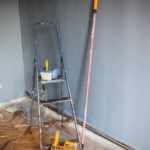Are you looking to renovate your home but struggling to find the necessary funds? In this article, we will guide you on how to find grants for home improvements. Making improvements to your home not only enhances its appearance but also increases its value and functionality. However, the cost of these projects can often be a barrier for many homeowners. That’s where grants come in – providing financial assistance to help you make the changes you desire.
Understanding the various types of grants available for home improvements is essential in navigating the application process effectively. Government grants are one avenue to explore, offering funding through different programs aimed at supporting homeowners in enhancing their living spaces. Non-profit organizations also play a crucial role in providing grants for home improvements, with specific focus areas and eligibility criteria that applicants must meet.
To successfully secure funding through a grant for your home improvement project, it is important to understand the eligibility requirements and how to craft a strong grant proposal. By researching government grants and exploring non-profit organizations offering grants, you can identify opportunities that align with your needs and goals. With the right resources and guidance, you can navigate the application process confidently and increase your chances of receiving financial assistance for your home improvement endeavors.
Understanding the Importance of Home Improvements
Home improvements are more than just aesthetic enhancements to your living space; they can also increase the value of your property and make your home more comfortable and energy-efficient. From upgrading your kitchen or bathroom to adding new siding or windows, investing in home improvements can have a positive impact on your quality of life.
However, the cost of these projects can often be a significant barrier for homeowners. This is where finding grants for home improvements can make a difference.
One of the key ways to find grants for home improvements is by researching government programs at the local, state, and federal levels. These programs offer financial assistance to eligible homeowners looking to make necessary upgrades to their homes.
For example, the Department of Housing and Urban Development (HUD) offers various grant programs aimed at improving housing conditions for low-income individuals and families. By understanding the specific criteria and requirements for each program, you can increase your chances of securing funding for your home improvement projects.
In addition to government grants, there are also non-profit organizations that provide funding for home improvement initiatives. These organizations may focus on certain geographic areas or specific populations, such as veterans or seniors.
By exploring these options and understanding their eligibility criteria, you can expand your opportunities for receiving financial support for your renovation plans. It’s important to thoroughly research both government grants and non-profit organizations offering grants to determine which ones align best with your needs and circumstances.
| Government Grants | Non-Profit Organizations |
|---|---|
| Department of Housing and Urban Development (HUD) | Habitat for Humanity |
| State-level housing agencies | Rebuilding Together |
| Local community development corporations | Aging in Place |
Types of Grants Available for Home Improvements
Home improvements are essential for maintaining the value and functionality of your home. However, funding these projects can often be a challenge. One way to offset the costs is by applying for grants specifically designed to help homeowners with their renovation needs. There are various types of grants available that cater to different needs and requirements, making it crucial to understand the options available to you.
Here are some common types of grants available for home improvements:
- Government Grants: Many government agencies offer grants to assist homeowners in making necessary repairs or upgrades to their properties. These grants may be provided at the federal, state, or local level, each with its specific criteria and application process.
- Non-Profit Organization Grants: Non-profit organizations focused on housing or community development may also offer grants to homeowners looking to improve their homes. These organizations often have specific focus areas or target populations, so it’s essential to research and find the right fit for your needs.
- Energy-Efficiency Grants: With a growing emphasis on sustainability and energy efficiency, there are grants available specifically for renewable energy installations or energy-efficient upgrades in homes. These grants not only help reduce utility costs but also contribute to a more environmentally friendly home.
When seeking out how to find grants for home improvements, consider exploring these different types of grants to determine which best suits your project needs and qualifications. Researching and understanding the eligibility requirements for each type of grant will help you narrow down your options and increase your chances of securing funding for your home improvement projects.
Researching Government Grants
When looking for ways to fund your home improvement projects, government grants can be a valuable source of financial assistance. Here are some steps on how to find grants for home improvements from various government agencies:
1. Start by visiting official government websites: Begin your search for grants by visiting websites such as Grants.gov, which is the largest database of federal grants. This website allows you to search for specific keywords related to home improvements and filter results based on eligibility criteria.
2. Contact your local housing authority: Many state and local governments offer grants specifically aimed at improving housing conditions within their jurisdictions. Contact your local housing authority or community development office to inquire about any existing grant programs available for homeowners.
3. Explore energy efficiency programs: Some government agencies provide grants focused on promoting energy efficiency in homes through upgrades such as insulation, windows, and heating systems. Check with the Department of Energy or Environmental Protection Agency for information on available grants in this category.
By taking the time to research government grants and understanding the application process, you can increase your chances of securing funding for your home improvement projects. It’s important to carefully review all eligibility requirements and submit a strong grant proposal to maximize your chances of receiving financial assistance.
Exploring Non-Profit Organizations Offering Grants
Non-profit organizations are a valuable resource for individuals seeking grants for home improvements. These organizations often focus on supporting communities by providing financial assistance for various needs, including housing renovations. By exploring the different non-profit organizations offering grants, homeowners can increase their chances of securing funding to improve their living spaces.
Local Non-Profit Organizations
One way to find grants for home improvements is to contact local non-profit organizations in your community. These organizations may have specific programs dedicated to assisting homeowners with making essential repairs and upgrades to their properties. By reaching out to these groups, homeowners can learn about the available grants and determine if they meet the eligibility requirements.
National Non-Profit Organizations
In addition to local non-profit organizations, there are also national non-profits that offer grants for home improvements. These organizations may have broader eligibility criteria and a larger pool of resources available for distribution. Homeowners can research these national non-profits online or through community resources to identify potential grant opportunities for their renovation projects.
Specialized Non-Profit Organizations
Some non-profit organizations specialize in providing support for specific types of home improvement projects, such as energy efficiency upgrades or accessibility modifications. By exploring these specialized non-profits, homeowners can find targeted grant opportunities that align with their renovation goals. It is essential to thoroughly research each organization’s mission and grant offerings to ensure a good fit for your project needs.
Eligibility Requirements for Grant Applications
When it comes to finding grants for home improvements, one of the key factors to consider is meeting the eligibility requirements set by the grant providers. These requirements can vary depending on the type of grant and the organization offering it. Some common eligibility criteria include income level, property ownership status, and specific project needs. It’s important to carefully review these requirements before applying to ensure that you qualify for the grant.
In addition to income and property ownership status, some grants may have specific requirements related to the type of home improvement projects that are eligible for funding. For example, some grants may only cover improvements that focus on energy efficiency or safety enhancements. Make sure to understand these project-specific eligibility criteria and assess whether your planned home improvement projects align with them.
To increase your chances of qualifying for grants for home improvements, it’s essential to meticulously gather all necessary documentation and information required for the application process. This may include proof of income, property ownership documents, project estimates or quotes, and any other relevant paperwork. By being prepared with all the necessary documentation upfront, you can expedite the application process and demonstrate your readiness to comply with the grant provider’s eligibility requirements.
| Grant Eligibility Criteria | Details |
|---|---|
| Income Level | Applicants must fall within a specific income bracket to qualify for certain grants. |
| Property Ownership Status | Sometimes grants are only available to homeowners or specific types of properties. |
| Project Needs | Some grants may prioritize particular types of home improvement projects such as safety or energy efficiency upgrades. |
By understanding and fulfilling these eligibility requirements when applying for grants for home improvements, you can position yourself as a strong candidate for securing funding for your projects. Take the time to research each grant opportunity thoroughly to ensure that you meet all criteria before submitting your application. Remember that meeting these requirements is just one step towards accessing financial assistance for enhancing your living space through valuable home improvements.
Tips for Writing a Strong Grant Proposal
When seeking financial assistance for home improvement projects, one crucial step is writing a strong grant proposal. A well-crafted proposal can significantly increase your chances of receiving funding for your desired renovations or repairs. Here are some tips to consider when drafting your grant proposal:
Clearly Define Your Project Goals and Needs
One of the most important aspects of a successful grant proposal is clearly articulating the goals and needs of your home improvement project. Explain in detail what specific renovations or repairs you are looking to undertake, why they are necessary, and how they will benefit your household or community. Providing a clear and compelling description of your project will demonstrate to grant providers that their support will make a meaningful impact.
Evidence-Based Justification
Back up your project goals with evidence-based justification. This could include statistics, data, case studies, or expert opinions that support the importance and feasibility of your proposed home improvements. By presenting a solid rationale for your project, you can build credibility and assure grant providers that their investment will be well-spent.
Showcase Your Ability to Execute the Project
In addition to outlining your project goals and justification, it’s essential to showcase your ability to successfully execute the proposed home improvements. Highlight any relevant experience, skills, or partnerships that demonstrate your capacity to effectively manage and complete the renovation or repair work. Grant providers want to ensure that their funding will be used efficiently and responsibly, so emphasizing your competence in executing the project is key.
By following these tips for writing a strong grant proposal, you can increase your chances of securing funding for home improvement projects. Remember to be clear, detailed, evidence-based, and confident in presenting your project goals and abilities. With a compelling grant proposal, you can make a persuasive case for why you deserve financial support for enhancing your living space through renovations or repairs.
Navigating the Application Process
Once you have identified potential grants for your home improvement project, the next step is to navigate the application process. This process can sometimes be overwhelming, but with careful planning and organization, you can increase your chances of securing funding for your project.
First and foremost, it is essential to carefully review all the requirements and guidelines outlined in the grant application. Make sure you understand what information needs to be included, any specific documentation needed, and any deadlines that need to be met. Failure to adhere to these requirements could result in your application being disqualified.
Next, gather all necessary documents and information needed for the application, such as proof of ownership of the property, income verification, project estimates, and any other required paperwork. Be sure to double-check everything before submitting your application to avoid any delays or issues in the review process.
Lastly, it is crucial to follow up on your application after submission. Keep track of any communication from the grant provider and be prepared to answer any additional questions they may have about your project. By staying on top of the application process, you demonstrate your commitment and professionalism in seeking funding for your home improvement project.
Resources for Finding Grants for Home Improvements
When it comes to finding grants for home improvements, there are several resources available to help homeowners navigate the process. One of the first places to start is by researching government grants. Government agencies at the federal, state, and local levels often offer funding programs specifically geared towards housing improvement projects. These grants can cover a wide range of upgrades, from energy-efficient installations to safety improvements.
Another valuable resource for finding grants for home improvements is non-profit organizations. Many charitable organizations focus on providing assistance to homeowners in need of critical repairs or renovations. These organizations may have specific eligibility requirements and application processes, but they can be a valuable source of funding for those who qualify.
Additionally, homeowners can utilize online databases and grant search engines dedicated to connecting individuals with available funding opportunities. These resources allow users to filter grants based on location, project type, and eligibility criteria. By utilizing these tools effectively, homeowners can increase their chances of finding the right grant for their home improvement needs.
Conclusion
Securing funding for home improvement projects can be a daunting task, but with the right resources and knowledge, it is definitely achievable. By understanding the importance of home improvements and knowing the types of grants available, homeowners can take the first step towards enhancing their living spaces. Government grants provide a significant source of funding, while non-profit organizations also offer assistance to those in need.
When considering how to find grants for home improvements, it is crucial to research eligibility requirements and understand what makes a strong grant proposal. By following these guidelines and tips, applicants can increase their chances of securing the funding they need for renovations or repairs. Navigating the application process may seem overwhelming at first, but with perseverance and attention to detail, individuals can successfully complete the necessary steps.
In conclusion, finding grants for home improvements requires dedication and thorough research. By utilizing resources available online or through local agencies, homeowners can identify potential funding opportunities that suit their needs. With persistence and a well-crafted grant proposal, individuals can secure the financial support necessary to enhance their homes and create a more comfortable living environment for themselves and their families.
Frequently Asked Questions
What Is the Ohio Housing Assistance Grant Program?
The Ohio Housing Assistance Grant Program is a state initiative aimed at providing financial assistance to individuals and families in Ohio who are struggling with housing-related expenses. This program offers grants to help with mortgage payments, rent, utilities, and other housing costs to prevent homelessness and housing instability.
Who Is Eligible for Government Home Improvement Grant in Wisconsin?
Eligibility for a government home improvement grant in Wisconsin typically depends on various factors such as income level, homeownership status, and the specific requirements of the grant program. Low-income homeowners, veterans, seniors, and individuals with disabilities may qualify for assistance with repairs or improvements to make their homes safer or more accessible.
What to Do When Your House Is Falling Apart and You Have No Money?
When your house is falling apart and you have no money, it’s important to explore alternative options for assistance. This can include reaching out to local community organizations, non-profit agencies, or government programs that offer home repair grants or low-interest loans.
Additionally, consider prioritizing repairs based on urgency and focusing on DIY solutions or temporary fixes until more permanent solutions can be arranged.

I’m thrilled to have you here as a part of the Remodeling Top community. This is where my journey as an architect and remodeling enthusiast intersects with your passion for transforming houses into dream homes.





